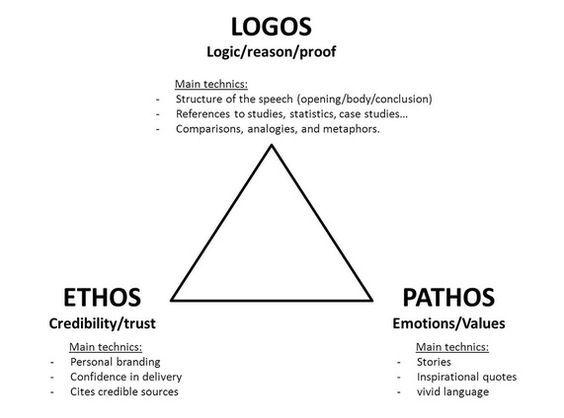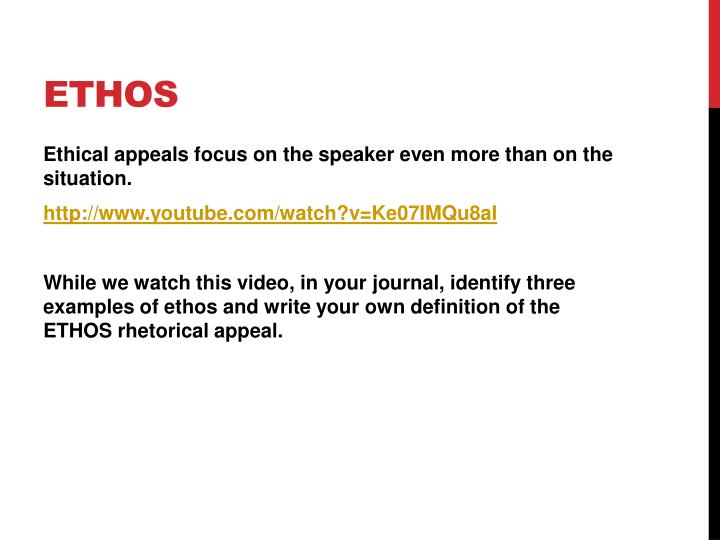

It does the opposite to the opponent's side. Reminds the audience of how important or superior the writer's points are Extenuation Extenuate force of points made by opposition. Amplification Amplify force of points made earlier.


5 main possible components of Peroratio 1) Ethos pushĥ) Affectus Ethos push Inspire audience with favorable opinion of you and unfavorable opinion of the opponents. Peroratio Conclusion, a finishing ofĮpilogos, say in addition Conclusions are vital for 2 reasons It is what the audience takes away from the text

Evaluation of soundness of the appeal and Confirmatio. Appeal to readers' values ( Standards for right & wrong, good and bad)ģ. Appeal to readers' needs ( Physical & Psychological well being.)Ģ. Non-artistic proof Factual data, expert opinion, testimony, examples. Appeals to needs and values Confirmatio draws on 2 types of proofs Artistic and Non-artistic Artistic proof More subjective because based on values and attitudes of the listener more difficult to control. Announces order in which proofs appears- making discourse easier to follow. Makes clear which issues need to be addressed by any party to the argument.Ģ. List the arguments to be used in the order they will appear. Plausibility Divisio/Partitio Can performs two functions:Ģ. What does Narratio needs to use? - Principle of via media Presents information in ways that favor the rheto´s position. Narratio-Expository Statement of fact/back story/background/ catch-upįundamentally expository (informs, reminds, summarizes) Self The self is the image that the writer or speaker wants to project. A good method to achieve your goal is to use the Appeals.The subject can sometimes be the same as the purpose. Subject The subject is how your are going to achieve your purpose. Audience The audience is the person or persons you are addressing. The purpose can also be to instruct or inform. It is often to persuade your audience to do something you want them to do or to see the subject the way you see it. Self Purpose The purpose determines what you want to achieve with your paper. Used in difficult cases where audience is hostile to rhetor or position. Insinuation Exordia Unobtrusively steals into the mind of the audience. Used with Mean, Ambiguous, and obscure cases. Introduction Exordia Direct, plain language introduction makes audience well disposed attentive, and receptive. Cicero 2 sorts of exordia to handle the variety the cases Introduction and Insinuation. Obscure Case a) Audience too slow to grasp orī) case itself involves difficult, complex matter.Īudience can't follow arguments in support of an issue for some reason, thus: Introduction must establish good toward audience. Introductions must defend issue on moral grounds. Ambiguous Case Partly honorable/ partly discreditable, which engenders good and ill will, point for decision doubtful also: doubt exists, or audience confused or audience doesn't understand. Uses Introduction to convince audience of importance of issue to them. Mean Case Audience regards this case as unworthy of serious attention. Difficult Case Has alienated sympathy of the audience. Obscure Honorable Case Needs no introduction audience is disposed to support at once. The rain beat heavily on the windshield and the slapping of the wipers made it hard to hear the police officer's footstep coming alongside the car." 5 Cicero's kind of cases. 'Now What? he thought as he pulled to the curb. "Fred glanced up and saw the flashing lights. Oldest and most effective for attention grabbing But you must bear with his long explanation because it will bring insight into his plight." Narrative Exordium Anecdote to arouse interest. "It may look bad, with Fred sitting in jail. But his lawyer will speak to the judge about the circumstances surrounding Fred's problem." Preparatory Exordium Explains unusual development/ forestalls misconception/ apologizes. "Fred was put into the cell without anyone listening to his story. Corrective Exordium Neglected/ misunderstood/ misrepresented and to correct that problem. "Fred was arrested for drunk driving, but hadn't touched a drop of alcohol. "Have you been arrested for drunk driving?" Paradoxical Exordium Points that seem improbable, but aren't. Inquisitive Exordium Ask provocative questions to hook the audience.


 0 kommentar(er)
0 kommentar(er)
